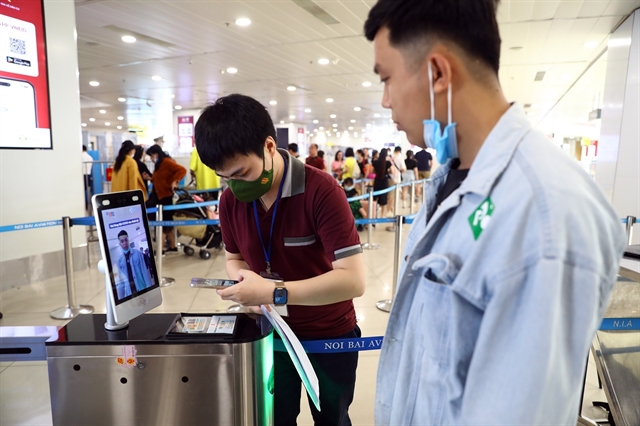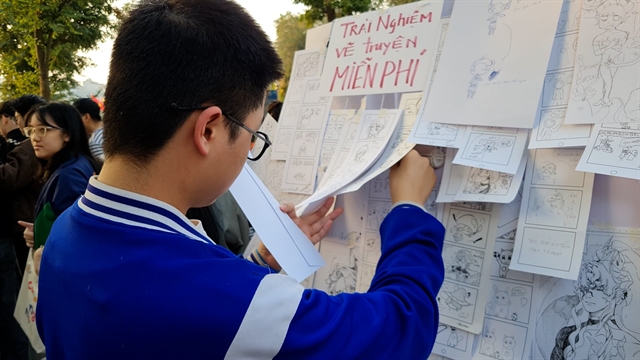 Society
Society

 |
| Passengers disembark a Vietnam Airlines plane at the Vân Đồn International Airport. — VNA/VNS Photo |
HÀ NỘI — Domestic air ticket prices have become a headache for many families and tourists making travel decisions. This has not only affected consumer pockets, but the domestic tourism and aviation industries as well, analysts have said.
The average price for economy class tickets on Việt Nam's domestic routes has surged by up to 25 per cent year-on-year.
"Aside from Việt Nam, airfares are generally high worldwide because prices are the function of supply and demand," said Subhas Menon, Director General of the Association of Asia Pacific Airlines.
"If demand is much more than supply, then prices tend to be high. So this is the case now. Just look at aircraft deliveries and delays. Supply is not keeping up with demand."
Economist Đinh Trọng Thịnh from the Academy of Finance said there were few airlines in Việt Nam and very few planes.
Aircraft recalls for inspection and repairs and the modest quantity of newly leased aircraft have led to a significant decline in the number of commercial planes in Việt Nam, Thịnh told congthuong.vn.
He said the more airlines a market had, the more competitive it would be, and airlines had to find ways to lower ticket prices to meet passenger needs. However, it would require complicated documents and policies to form new carriers in Việt Nam.
In developed countries, high travel demand has resulted in many airlines. At the same time, costs can be reduced thanks to a high volume of passengers. Furthermore, these countries also have many low-cost airlines that have slashed accompanying services to make ticket prices more suitable and diverse.
In addition to increasing the market competition, taxes, and fees charged on each airline ticket could also be considered to be reduced, Thịnh said.
Cooperation needed
 |
| Foreign travellers visit Văn Miếu (Temple of Literature) – Quốc Tử Giám (First National University) complex in Hà Nội. —VNA/VNS Photo Trần Việt |
According to aviation experts, to balance the benefits between airlines, tourism, and customers, not only airlines should reduce ticket prices, but stakeholders in the tourism industry, including travel companies, hotels, and travel service providers, must closely cooperate.
They see affordable comprehensive travel packages as an effective solution. Airlines can team up with hotels and tourism service providers to offer all-inclusive travel packages, helping travellers save time and money in planning. They also suggested appropriate tax and fee calculations to lower ticket prices.
Nguyễn Quốc Kỳ, chairman of Vietravel Airlines, said the shortage of aircraft and input cost hikes would continue to beset the aviation industry, at least until the end of the year. Thus, the cooperation of many units was needed to reduce the price of flights.
Localities that want to stimulate tourism could encourage and consider supporting airlines when they open new routes. In return, airlines could help travel businesses by reducing deposits for bookings or allowing them to divide payment into several payments, Kỳ said during a recent conference in HCM City.
He added that localities, tourism service providers, travel firms, and airlines should assist each other based on a common supportive policy from the State.
Aviation experts agreed. They have petitioned the Government and tourism management agencies to consider reducing taxes and fees to encourage tourism and create better conditions for the aviation industry.
Slashing taxes and airport fees can also help airlines reduce operating costs, thereby lowering ticket prices later. However, tax and airport fee reductions need to be carefully calculated so that the State budget is not seriously affected.
Besides this, the State and tourism management agencies can support the aviation industry by investing in infrastructure development and tourism promotion. These measures help lower costs for airlines, boost tourism demand and allow passengers to enjoy better services.
In a recent move, the Ministry of Transport has ordered the Civil Aviation Authority of Vietnam (CAAV) to research solutions to reduce ticket prices on domestic flights while benefiting the State, businesses, and passengers.
The ministry has asked the CAAV to ensure compliance with laws on flight ticket sales and listings among airlines and enforce any violations of pricing regulations. This can be done with the assistance of specialised inspection units.
The authority will also work with the Vietnam National Administration of Tourism, localities, local airlines, and travel agencies to develop service ‘combos,’ which are expected to diversify the market and reduce costs.
In addition to increasing capacity on domestic flight routes, the CAAV will also facilitate adding more aircraft to existing fleets in response to rising travel demand in peak seasons.
Meanwhile, the Transport Development and Strategy Institute is responsible for coordinating the development of databases related to air travel demands and airfares on domestic, regional, and international routes. This is expected to contribute to the analysis, forecasts, and policy advice to enhance transport capacity, thereby reducing travel prices to boost tourism activities and economic growth.
Local airlines are required to strictly adhere to regulations on domestic air transport as well as price listings. Passenger ticket price components must be declared in full and cannot mislead customers.
Carriers also need to adopt flexible fare ranges and promotion policies for domestic flights in alignment with travel demands during major tourism and festival programmes, in addition to increasing the size of their fleets.
They must also be proactive in informing their customers about promotions and tourism products through the media, travel agencies, and tourism departments. — VNS
Ministries take main responsibility for lowering domestic airfares
The Ministry of Culture, Sports, and Tourism (MoCST) and the Ministry of Finance (MoF) have taken the lead in reducing domestic air ticket prices.Minister of Culture, Sports, and Tourism Nguyễn Văn Hùng delivered this statement at the National Assembly’s question and answer session in Hà Nội on Thursday.
Airfares accounted for 30-40 per cent of tour prices, so the air ticket price hike has reduced the competitiveness of tours.After working with ministries and departments, the MoCST discovered air ticket prices increased because they depend on service expenses at the airport and fuel input costs, Hùng said, adding that the insufficient quantity of aircraft has also affected aircraft prices.
The MoCST proposed the ministries and transport and finance to promptly report to authorities to consider and promulgate policies to facilitate the reduction of airport charges, that would help lower tour prices.
The ministry suggested airlines ensure their aircraft and design more night flights to better meet the travelling needs of people and tourists as well, Hùng said.
According to Hùng, his ministry has also recommended travel businesses optimise tour programmes with flexible destinations and support each other to slash costs.With the above proposals having been considered and approved and directions of the Prime Minister, air ticket prices have begun to cool down from May 28, according to Hùng. — VNS